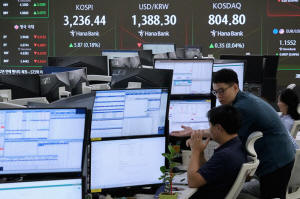Asian shares are mixed after China-US talks end without a trade deal
[July 30, 2025] By
ELAINE KURTENBACH
BANGKOK (AP) — Shares in Asia were mixed on Wednesday after the U.S. and
China ended their latest round of trade talks without a deal. U.S,
futures edged higher while oil prices slipped.
Beijing’s top trade official said China and the United States agreed
during two days of talks in Stockholm, Sweden, to work on extending an
Aug. 12 deadline for imposing higher tariffs on each other. The U.S.
side said an extension was discussed, but not decided on.
U.S. Trade Representative Jamieson Greer said the American team would
head back to Washington and “talk to the president about whether that’s
something that he wants to do.”
A Friday deadline is looming for many of Trump’s proposed tariffs on
other countries. Several highly anticipated economic reports are also on
the way, including the latest monthly update on the job market.
“Markets had been floating on a cloud of trade optimism — first Japan,
then the EU — but the sugar high is wearing off. Now, with U.S.-China
talks dragging on in Stockholm, there’s a growing sense that the
momentum is stalling,” Stephen Innes of SPI Asset Management said in a
commentary.
Hong Kong's Hang Seng index shed 0.1.2% to 25,213.15, while the Shanghai
Composite index gained 0.2% to 3,616.30.
Tokyo's Nikkei 225 index fell less than 0.1% to 40,654.70. Gains for
electronics companies were offset by losses for major exporters like
Toyota Motor Corp. and Honda Motor Co.
Australia's S&P/ASX 200 climbed 0.6% to 8,756.40 and in South Korea, the
Kospi gained 0.7% to 3,254,47.
Taiwan's Taiex rose 1.1%. In India, the Sensex added 0.3%.

On Tuesday, U.S. stock indexes edged back from their record levels as a
busy week for Wall Street picked up momentum. The S&P 500 fell 0.3% to
6,370.86, while the Dow Jones Industrial Average lost 0.5% to 44,632.99.
The Nasdaq composite was down 0.4% at 21,098.29.
SoFi Technologies jumped 7.4%, but Merck dropped 2.2% and UPS sank 9.2%
following a torrent of profit reports from big U.S. companies. They’re
among the hundreds of companies telling investors this week how much
they made during the spring, including nearly a third of the stocks in
the S&P 500 index.
[to top of second column] |

Currency traders work near a screen showing the Korea Composite
Stock Price Index (KOSPI), top left, and the foreign exchange rate
between U.S. dollar and South Korean won, top center, at the foreign
exchange dealing room of the Hana Bank headquarters in Seoul, South
Korea, Wednesday, July 30, 2025. (AP Photo/Ahn Young-joon)
 UnitedHealth Group dropped 5.8%
after reporting a profit for the spring that fell short of analysts’
expectations. It also gave a forecast for profit over all of 2025
that investors found disappointing. The health care giant said it
expected to earn at least $16 per share, when analysts were looking
for something close to $20, according to FactSet.
Shares of Novo Nordisk that trade in the United States tumbled 21.3%
after the Danish company cut its forecast for sales growth this
year, in part because of lower expectations for its Wegovy
weight-loss drug amid high competition.
Treasury yields sank as the Federal Reserve began a two-day meeting
on interest rates.
Despite pressure from President Donald Trump for lower rates, which
would give the economy a boost, the widespread expectation is that
the Fed will wait for more data about how Trump’s tariffs are
affecting inflation and the economy before making its next move.
The U.S. economy appears to be slowing.
One report Tuesday said that U.S. employers were advertising fewer
job openings at the end of June than a month before, though still
more than economists expected. A separate report said confidence
rose among U.S. consumers, but a measure of their expectations about
the near term remains below the level that typically signals a
recession ahead.
In other dealings early Wednesday, U.S. benchmark crude oil shed 1
cent to $69.20 per barrel, while Brent crude, the international
standard, was up 2 cents at $71.70 per barrel.
The dollar fell to 147.90 Japanese yen from 148.48 yen. The euro
rose to $1.1559 from $1.1546.
All contents © copyright 2025 Associated Press. All rights reserved |